I was in Chicago recently and had drinks with the wonderful novelist (and friend-in-snark) Lori Rader-Day. As so often happens when two or more writers gather in the same space, we were about half of a gin-and-tonic in when we started talking about writing. Specifically, we started talking about short stories.
Most fiction writers say they are either a novelist or a short story writer. A few do both exceptionally well, but generally we tend to fall to one side of the fence or the other. Novelists will tell you they fight to find a way to contain their stories to less than eighty thousand words, while short story writers may struggle with the expanse and multiple needs of a novel.
While I began as a novelist, writing six books in the course of four years, I’ve branched out into short stories since 2020, and I’m just comfortable enough to recognize how my own writing process goes for that particular format.
This circles back to talking process with Lori in Chicago, where I said that my short stories are “five ideas in a trench coat.”
What this means is, my short stories are a synthesis of ideas—a handful of things that could be something that randomly struck me as I was thinking about the story, or it could be a thesis I return to time and again. It usually takes me pulling together these five or so items before I really know what the story is, but then I have enough to get me to the journey’s end.
(Lori’s correlative to this for novels was “Thirty-Five Ideas in a Wardrobe.” We’ll be working on that writing guide for 2026; look out, Save the Cat!)
How do I pull together five ideas into a short story? Just for fun I thought I’d use my story “Knock” as an example. (“Knock” just so happens to be nominated for a Best Short Story Anthony Award at Bouchercon in Nashville this week.)
“Knock” was originally published in PLAYING GAMES, edited by the legendary Lawrence Block.
(We’re gonna go into heavy spoiler territory here, so if you want to read the story and come back, now would be the time.)
(Done? Great. Let’s go.)
So The Five Ideas are:
Idea #1: The big umbrella
I think most writers have a theme they explore throughout their work. Robert B. Parker’s Spenser was forever looking at codes of honor and the evolving relationships of men and women. Elmore Leonard was concerned with independence and autonomy—almost undoubtedly relating back to his early career in Westerns. The V.I Warshawski novels by Sara Paretsky have chronicled the changing face of feminism and the interconnectivity of politics and big business for more than 40 years.
I write about lies. Yes, it’s crime fiction, so lying is just part of it, but I’m most interested in the lies we tell ourselves and how those lies reflect on the lies we tell others. Because the lies we tell other people might serve a variety of purposes, but the lies we tell ourselves are usually in the service of making us believe we are someone different than we are.
“Knock” is about two men: Art, a former mobster now in witness protection, running a bait shop in the middle of nowhere, and Jimmy, a true-crime podcaster trying to get Art to tell him his life story. The story plays out over the course of a game of gin rummy between the two men.
I love stories about old criminals. James Caan has the line in THE WAY OF THE GUN: “The only thing you can guess about a broken down old man is that he is a survivor.” I wanted Art to be a survivor, and to be have survived the way he has, it means he turned on his friends and on those who might have loved him. He’s someone who treated murder as just another part of the job. For example, when he remembers how it was a former lover who helped the Feds trap him, Art didn’t have a problem dealing with her.
Elaine had a coke problem and a kid in foster care. Promises were made to place her in rehab and help her get the kid back if she did this one thing. Art had trusted her, confided in her, and when those Feds played his voice back to him...
He understood why Elaine did what she did. He'd grown up without his own mother. But it didn't change what had to be done, and the cops never found Elaine’s body. Art figured he was okay, and Elaine’s kid would be okay as well.
Art regrets not the terrible things he did, but that he got caught, and how he’s now an old man living at a bait shop, left with nothing but memories of what he perceives as better times.
Idea #2: The hook
The call for PLAYING GAMES was that each story involve a game. I chose gin rummy because it’s a two-player game that exploded in popularity after World War II. It’s easy to imagine as something played by Chicago mobsters of the Fifties, and how vital it would be to a young Art—born Silvio Gualdoni—as he admired the men he saw growing up.
Jimmy moved the cards around in his hand.
“This was what you played in your old neighborhood, right?”
“Yeah,” Art said, trying to sound nonchalant. “We played.”
Nonchalant because Jimmy couldn't understand what the game meant, how it'd changed Art's life. Art turning twelve, and he’d already stopped going to school, realizing there wasn't much the nuns could teach him he wanted to know. No, Art's true education began at Martell's Barbershop down on 29th Street, and the card games in back.
Martelli’s had been a de facto business center for men of the neighborhood. They came for straight razor shaves, to play cards and read Playboy, to take phone calls and do business. The air was always thick with hair tonic, bay rum, and cigar smoke, and it was intoxicating to Art.
My stories tend to be two-handers, where a pair of characters go back and forth, slowly revealing themselves to one another, or fighting to maintain the veil they have up. A game of cards was a good method to explore how Art and Jimmy could relate to one another, and ultimately show how little Jimmy actually knew or understood Art. I made a little text of that subtext in an exchange between Art and Jimmy.
“Think about every hand of cards. I can't see yours, and you can't see mine. Those are our secrets, and we want them hidden. You're pulling groups together. Melds. Those are your friends. You keep your friends, and you keep them close. The cards you can't use are deadwood. You get rid of that. Have as little deadwood as possible before you—” He tapped his knuckles on the tabletop, placed a four of diamonds into the discard, and laid out the rest in a spread. “Go out. That's when we show everyone what we've been hiding all along.”
Jimmy shook his head. “Your metaphor doesn't work.” He waved a finger toward Art's cards. “What I see is your friends and your secrets blurred together, and no one'll say that's healthy. Besides, my mother always told me to never trust someone with too much to hide.”
Art smiled. “I was a crook, Jimmy. She probably would have told you not to trust me, anyway.”
Idea #3: The in-joke
In between the various betrayals and murders, I like to slide in some gallows humor. Most often that’s in a joke or a line of dialogue almost no one else will notice, but that I will probably find funny as hell.
Art finished his beer and got up to grab another. Fishing through the cardboard case, thinking about the cops and men from the neighborhood both who'd still put him in the ground given half a chance. How if you lived long enough, your friends and your enemies all become the same.
“Mind fetching me another big orange?” Jimmy said.
I don’t know if there are many people who remember how Andy Griffith—before he became a TV star—started out as a comedic monologuist, and his most successful bit was called “What It Was, Was Football,” about the first time a country boy watches a football game.
This whole story is fantastic, but for reasons I don’t understand about myself, the way Griffith draws out the words “big orange” makes me laugh until my ribs hurt. Has Jimmy ever heard this story? Probably not, but he’s calling a Fanta a “big orange” because I wrote the story. You get to do those things when you’re the writer.
Idea #4: The spin and twist
“Knock” isn’t only about the card game. It’s couldn’t only be about Art and Jimmy talking about Art’s past. I wanted a contrast between the romanticized world of mobsters Jimmy imagines, the brutal Art remembers, and the changing world outside the bait shop door. It’s why, during the game, Jimmy hears a noise outside, and Art thinks about the homeless who’ve taken up living around the lake where the bait shop is.
That stiffened Jimmy's spine. The nearby town had possessed a homeless problem until the chamber of commerce and the tourism board convinced the powers that be that panhandlers were dragging down the economy. The homeless were pushed out to the lake and the surrounding hills—public lands—where they roamed campsite to campsite, looking for food, begging for spare change. They came into the shop and bought cheap beer and expired sandwiches, paying with singles and handfuls of quarters.
This story was written during the summer of 2021, as the economy struggled in the midst of the pandemic, and cities found themselves coping with an explosion of unhoused individuals and families. The news reported of cities rounding up the unhoused and shipping them into other communities. Rather than actually addressing the issues of housing, jobs, and mental health, the decision was to turn human beings in crisis into someone else’s problem. There were reports of people developing ad-hoc communities in wooded areas, in forests and around lakes and rivers, close to vacationers.
It became easy to imagine how someone like Art could use this to his own ends. This becomes an additional complication in the story—one Art understands but Jimmy doesn’t know about—and it adds to the layer of lies based around Idea #1.
Idea #5: The bitter end
The most important words in any story as the ones which open it, and the ones that close it. Readers want a strong landing at the end of their trip, and you want to leave them thinking about the journey once they’ve finished.
Because I’m writing noir, we’re talking about downbeat endings here. And “Knock” has about as downbeat of an ending as possible. In short, a homeless man attempts to rob the bait shop with a pistol. Art manages to take the pistol from the man, then stabs him to death with a fillet knife, ostensibly saving both him and Jimmy.
Except the whole thing was a set-up by Art to create a situation where a still worshipful-but-now terrified Jimmy would join Art in a criminal career. But first, they’ve got to get rid of a dead guy.
The kid was scared, but scared was okay. He'd be good for the long drive back to Chicago, Art thought. But then what?
This whole year, Jimmy had pushed Art to relive his past. Tell him where the bodies were buried. But he could do better than that. Now he could show him.
Around the time I was writing “Knock,” I heard a story on NPR about ex-mobsters moving into podcasting. I couldn’t imagine guys like Sammy “The Bull” Gravano or Michael Franzese commodifying their lives into the stories people listen to while they’re on a car trip or at the gym, but in truth, it isn’t any different than how Henry Hill had done the book WISEGUY, which became the Scorsese movie GOODFELLAS.
I kept thinking, they’re old men now, but an old dog’ll still bite.
The end of “Knock” questions if we ever truly stop being the person we once were. Art hasn’t been Silvio Gualdoni in decades, and in the end, he seems to be that person once again—for better or, most likely, for worse.
SHAMELESS SHILLING
Like I said, this week (Wednesday, August 28—Sunday, September 1) is the annual World Mystery Convention, or Bouchercon. It’s being held at the Gaylord Opryland Resort in Nashville, Tennessee, and this year’s theme is “Murder and Mayhem in the Magic City.”
Bouchercon is basically the prom for crime writers, and I ain’t lying when I tell you I love it every year—not just as a writer, but as a fan, getting to talk shop with the folks whose work influences and inspires me.
I’ll be moderating one panel, and interjecting a few ideas and probably some terrible jokes into others. Drop by a panel, or catch me in the hall and let’s talk. Nothing makes me happier than getting to this very thing.
My panel schedule:
Wednesday, August 28
Noon, Canal CD - Mezzanine
How Deep Is Your Love
4:30 p.m., Bayou AB - Mezzanine
Mama Told Me Not To Come
Sunday, September 1
8 a.m., Canal CD - Mezzanine
Never Have I Ever
I’d be remiss if I didn’t mention (again) I’ve got two works up for Anthonys this year: the aforementioned “Knock” for Best Short Story, and BECAUSE THE NIGHT is nominated for Best Paperback Novel.
Rather than nominees panels this year, there’s an Anthony nominees meet-and-greet from 4 pm-4:50 pm on Thursday, August 29 at Delta C - Level 2 at the convention area.
There’ll also be a reading at Mickey’s Tavern afterwards, 5:30 p.m., featuring some of this year’s Anthony-nominated authors. If you’re reading this, you’re invited. Do hope to see you there.
That’s all we’ve got for now. Thanks for coming. See you next time, and hey, let’s be careful out there.

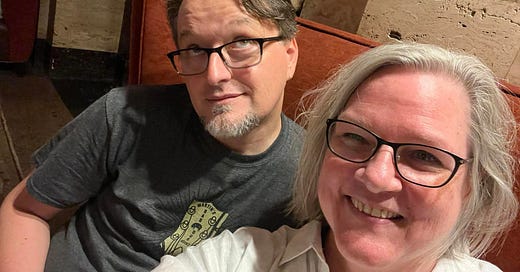



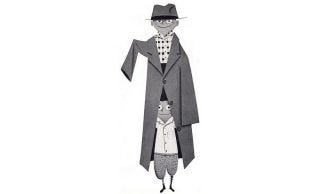
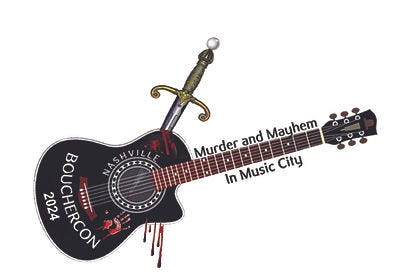
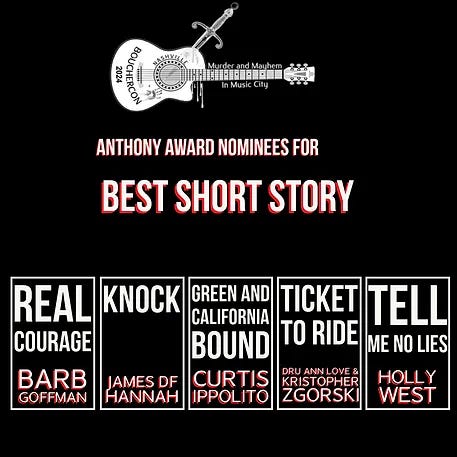
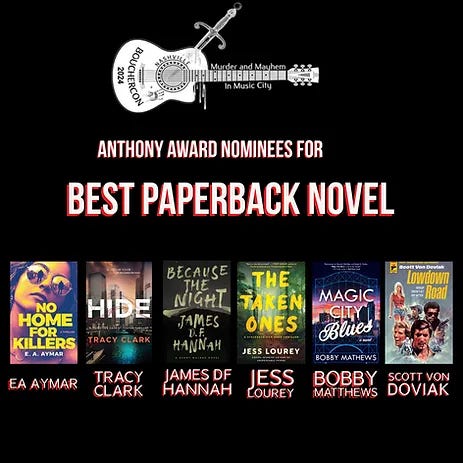
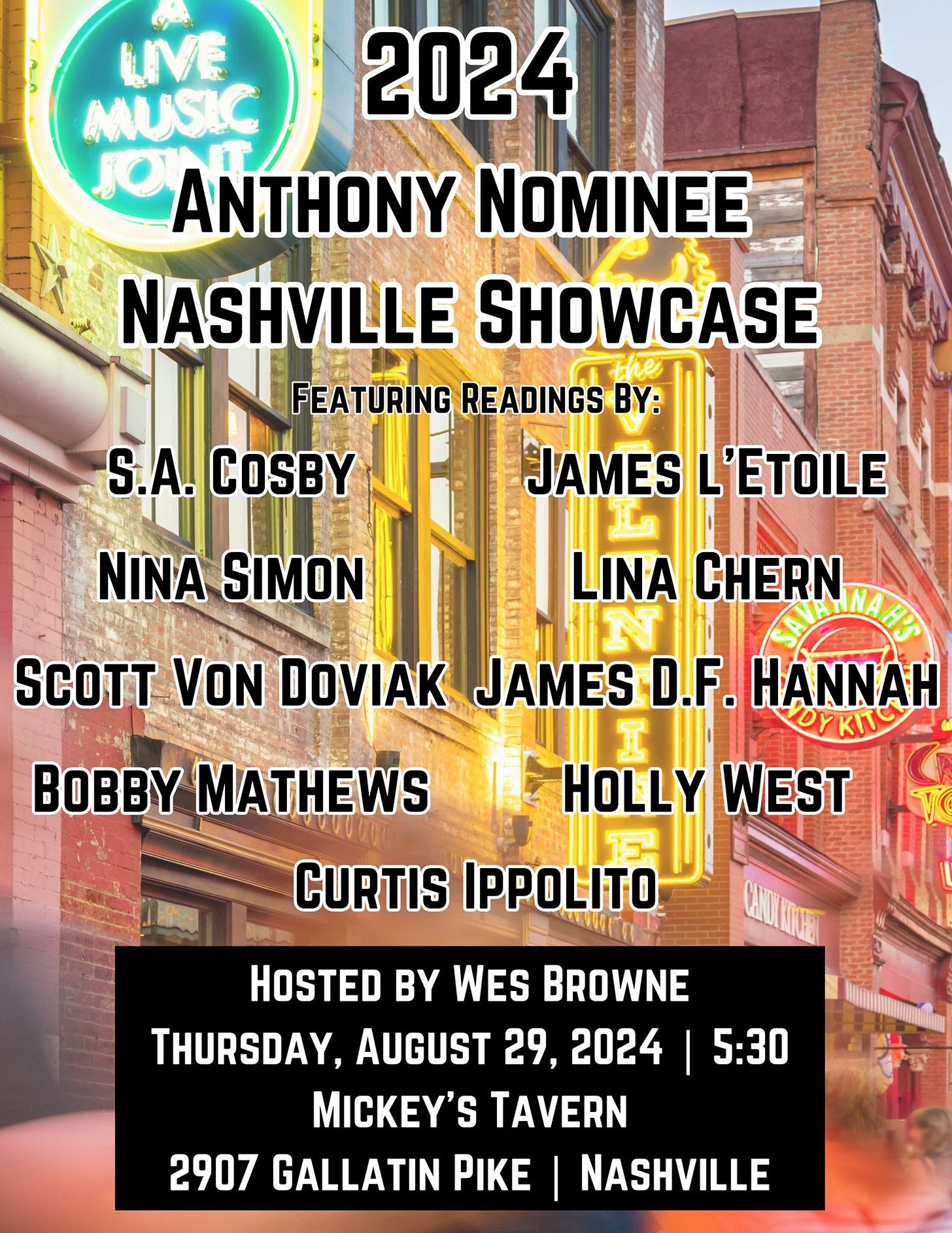
Interesting post, James. I wonder how much of the 5 ideas were clear in your head when you started writing. I tend to have a theme and a starting point idea, and then the story evolves. Sometimes I know where it'll end, sometimes it changes in the process. I'm curious to know how it works for you, in short stories.